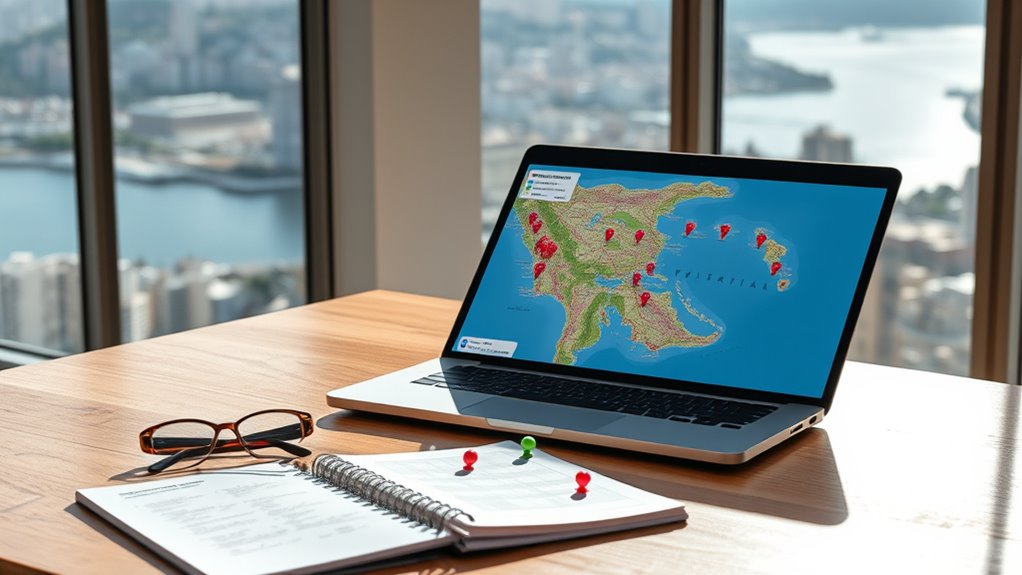To turn your overseas property dreams into reality, start by assembling a reliable legal team who understands local laws and regulations. Next, plan your financial strategy, considering all costs like taxes, legal fees, and ongoing expenses. Conduct thorough market and location research to find the best fit, then navigate local practices and question trustworthy agents. Clarify residency and ownership rules, perform due diligence, and prepare for the closing process. Continue to explore each step to make your goal a tangible success.
Key Takeaways
- Conduct thorough market research, including location analysis, legal requirements, and local customs for a smooth purchase process.
- Verify property titles, legal documents, and compliance with local laws through due diligence and legal counsel.
- Establish a clear financial plan covering purchase costs, taxes, ongoing fees, and potential rental income.
- Engage with local authorities and legal experts to facilitate paperwork legalization, permits, and closing formalities.
- Prepare for the closing by scheduling documents, notarizations, and ensuring all legal and procedural steps are completed.
Assembling Your Legal Team and Understanding Local Regulations

When buying your first overseas property, assembling a skilled legal team is crucial to steering the complex local regulations and ensuring a smooth transaction. Your lawyer verifies the legitimacy of the property title to prevent ownership disputes and drafts or reviews purchase agreements tailored to international deals. They ensure contracts comply with local laws and include currency conversion clauses, addressing contingencies and risks. Your legal team also guides you through local property laws, zoning, building codes, and foreign investment rules, helping you obtain necessary permits and licenses. They act as a liaison with authorities, resolving title issues and tax exposures before transferring funds. Additionally, they advise on ownership structures, estate planning, and cultural practices, ensuring your transaction aligns with legal requirements and local customs. Understanding homeownership regulations and their meanings can also help you interpret potential concerns or opportunities related to your property investment journey. Familiarity with local property laws can further aid in navigating unexpected legal challenges during your purchase process.
Planning Your Financial Strategy and Budgeting for Ownership

To successfully purchase and own overseas property, you need a clear financial plan that covers all costs, including purchase expenses and ongoing fees. It’s also essential to explore your financing options and understand how currency fluctuations might impact your budget. Additionally, evaluating the rental income potential can help determine if your investment will generate desired returns. Being aware of proper planning can help you avoid costly errors and maximize your benefits throughout your investment journey. Incorporating space and organization strategies into your property management can also enhance your living experience and property value. Recognizing potential trust issues in relationships can also inform your decision-making process, especially when managing shared or investment properties.
Cost Breakdown Analysis
Understanding the full financial picture is essential before purchasing an overseas property, as costs extend beyond the initial price. Your main upfront expense is the property itself, but additional costs include legal fees of 3-5% of the property value and transfer taxes or stamp duties, which can add 8-15%, depending on the country. Notary and registration fees may also apply, costing several thousand euros or pounds, plus survey fees up to £3,000 for inspections. Recurring expenses include annual property taxes, maintenance, insurance, and management or HOA fees, which vary widely. Tax obligations on rental income and capital gains can considerably impact your budget, while operational costs like utilities and transfer fees contribute further. Properly accounting for all these costs ensures a realistic financial plan for overseas property ownership. Additionally, incorporating essential cost analysis strategies can help you better estimate and manage these expenses effectively.
Currency and Financing Options
Planning your financial strategy for an overseas property involves exploring various currency and financing options to suit your needs. Local banks often provide mortgages with terms aligned to the country’s market conditions, while international lenders can offer tailored loans but might have higher rates and stricter eligibility. Opting for a foreign mortgage exposes you to local legal systems and regulations. Countries with friendly lending practices, like Portugal or Panama, may offer better opportunities. You can also leverage home equity loans or personal loans if traditional financing isn’t available, though these may come with higher interest. Paying entirely in cash remains the simplest route, avoiding interest and exchange rate risks. Researching local laws and regulations is essential to ensure compliance and a smooth transaction process. Additionally, understanding cross-border banking and transfer fees can help you plan your budget more accurately. Being aware of the potential impact of currency exchange fluctuations can also protect your investment over time. Considering the availability of local financing options can further influence your overall purchasing strategy, especially in countries with developing banking sectors. Developer or private financing can also be options, but require thorough due diligence to understand terms and risks involved.
Rental Income Potential
Evaluating the rental income potential of an overseas property requires analyzing key factors like rental yield and market growth rates. Rental yields vary widely; for example, Bulgaria offers about 6.24%, while Canada and Germany hover around 4%. Emerging markets like Dominica and St. Kitts show attractive yields between 5% and 8%, supported by steady growth rates of 3% to 4.2%. High-yield areas such as Dubai can reach up to 8.76%, thanks to strong tourism and economic drivers. Keep in mind, local demand, tourism appeal, and supply limits influence yields. Additionally, consider tax implications, which differ by country, affecting net income. Rental yield figures are crucial for estimating profitability and comparing different markets. Carefully project monthly rent levels and account for ownership costs, maintenance, and currency fluctuations to build a realistic rental income strategy. Moreover, understanding the regulatory environment is essential to ensure compliance and avoid potential legal issues that could impact your returns. Incorporating home decor elements, such as appealing interior designs, can also increase rental attractiveness and occupancy rates, further enhancing income potential. Staying informed about market trends can help you adapt your strategy and maximize your rental income over time.
Conducting Market and Location Research to Find the Ideal Area

Conducting in-depth market and location research is essential to identify the best area for your first overseas property purchase. Use quantitative data, like property prices, rental yields, and supply-demand dynamics, analyzed through statistical and econometric models, to gauge market health. GIS mapping helps evaluate neighborhoods based on amenities, transport, and safety, highlighting micro-market trends. AI and machine learning uncover hidden patterns, forecast future price movements, and optimize investment strategies. Complement this with on-the-ground visits and interviews to capture local insights, neighborhood vibe, and upcoming infrastructure. Additionally, examining local attractions and amenities, such as nearby water parks, can influence the desirability and value of the area, providing a more comprehensive understanding of the location’s potential. Incorporating community engagement strategies can further reveal important social dynamics and resident satisfaction levels, which are key indicators of neighborhood stability. Finally, leverage market reports and data platforms to access extensive insights, ensuring you base your decision on solid, multi-dimensional information. Incorporating low light office plants can also improve your work environment during research phases, boosting productivity and well-being.
Navigating Local Real Estate Practices and Choosing Trustworthy Agents

Understanding local real estate practices is vital for a smooth purchase, so you’ll want to learn about local customs, costs, and legal steps. Choosing a trustworthy agent who is transparent, experienced, and committed to your interests guarantees you get reliable guidance. Clear communication and thorough knowledge of negotiation and closing procedures will help you navigate the process confidently. Additionally, being familiar with the self-guided research methods can empower you to make informed decisions throughout your property journey. Recognizing dog names that suit your lifestyle and preferences can also be a fun way to personalize your experience as you settle into your new property.
Recognizing Local Norms
Guiding local real estate practices requires you to be aware of cultural norms and legal differences that influence property transactions. You need to understand how taxes vary—some places tax property transfers, others mortgage recordings, and special taxes like mansion taxes may apply. Recognize that title insurance is common in some countries but rare elsewhere, affecting risk management. Cultural communication styles differ; some cultures favor formality and directness, while others involve extended family in decisions, lengthening the process. Negotiation tactics vary; some markets expect bargaining, others prefer fixed prices. Be aware of property ownership restrictions, such as limits on foreign ownership or land types. Finally, familiarize yourself with local business customs, holidays, and etiquette to navigate interactions smoothly and build trust.
Finding Reliable Agents
Finding a reliable agent is essential for a smooth overseas property purchase, especially since local practices can vary widely. You need someone with verified credentials, such as a valid license and membership in reputable associations, showing they adhere to ethical standards. Look for agents with specialized international real estate training and a solid educational background. Assess their local market knowledge, including neighborhood details and market trends, to ensure they can source off-market deals and communicate fluently. Prioritize agents who put your interests first, are transparent about fees, and provide clear guidance throughout the process. Additionally, verify their expertise in local laws, documentation, and cross-border transactions. Use this table to evaluate potential agents:
| Credential Verification | Market Expertise | Client Focus | Legal Navigation |
|---|---|---|---|
| Licensing & Associations | Neighborhood Knowledge | Buyer Priority | Property Laws & Regulations |
| International Certifications | Market Trends & Deals | Transparency & Communication | Cross-border & Payment Systems |
| Education & Disciplinary Record | Local Community Understanding | Responsiveness | Documentation & Compliance |
Negotiation and Closing
Understanding local real estate practices during negotiations and closing requires you to be well-informed about specific procedures, legal requirements, and cultural norms. You’ll need to navigate document legalization, such as Apostilles or sworn translations, and guarantee you’ve obtained necessary local tax IDs like Brazil’s CPF before signing. Notaries or officials—like Mexico’s Notario Público—verify titles, clear liens, and register transactions, while closing typically involves signing deeds, bills of sale, and loan documents. Financial transactions are secured through escrow or attorneys to protect your funds. Conduct thorough title searches and verify no liens or debts via certificates, considering title insurance for extra protection. Work with legal professionals to ensure proper ownership transfer, and coordinate with all stakeholders to facilitate smooth negotiations and legal compliance.
Clarifying Residency, Ownership, and Visa Requirements

Clarifying the residency, ownership, and visa requirements for overseas property purchases is essential before making your investment. Countries often link residency to property investments, with thresholds from $100,000 to over $1 million, requiring you to maintain the investment for several years and meet minimum stay periods. Some nations offer temporary permits tied to ownership, progressing to permanent residency or citizenship after several years. Foreign ownership rules vary—some countries restrict land rights or limit full ownership to condos—while others allow leaseholds or corporate structures. Visa conditions often demand physical presence, with renewal based on ongoing ownership and compliance.
| Residency Type | Requirements | Ownership Restrictions | Visa Conditions |
|---|---|---|---|
| Investment-Based | 3-5 years, stay requirements | Leasehold, zones | Physical presence needed |
| Citizenship Path | 4-7 years, legal criteria | Full or limited ownership | Regular renewals |
Performing Due Diligence and Preparing for the Closing Process

Before you finalize your overseas property purchase, performing thorough due diligence and preparing for the closing process are essential steps to avoid surprises and ensure a smooth transaction. Start by verifying the legal description of the property, confirming ownership details, and ensuring there are no encumbrances like liens or easements. Review all relevant documents, including deeds, title policies, and zoning approvals, to ensure compliance with local regulations. Conduct a detailed physical inspection, checking for structural issues, utilities access, and environmental hazards. Gather seller’s corporate documents and verify their legal standing. Coordinate with professionals to resolve pending issues, review purchase agreements, and understand closing costs. Schedule final inspections, confirm title transfer procedures, and ensure all documents are verified and ready for a seamless closing. Additionally, utilizing a Virtual Data Room (VDR) can streamline document reviews and enhance security during the due diligence process.
Finalizing the Purchase and Securing Your New Property

Finalizing your purchase and securing your new property involves coordinating multiple steps to guarantee everything proceeds smoothly. First, schedule the closing date with your legal team and all involved parties, ensuring availability. Confirm that all required documents are legalized, apostilled, and translated if necessary, especially in jurisdictions like Brazil. Obtain any essential identification numbers, such as a CPF, ahead of time. Review all documents with your attorney and consider having legal counsel present during closing. Verify the local authority accepts your paperwork and request any missing documents beforehand. Proper documentation is crucial to prevent delays or legal issues. – Coordinate with legal representatives to set the closing date. – Ensure all documents are properly legalized, translated, and approved. – Review and sign the final purchase agreement and transfer documents in the presence of all parties.
Frequently Asked Questions
How Do I Verify the Authenticity of Property Titles Abroad?
You need to verify the authenticity of property titles abroad by checking official land registry websites or apps specific to that country, like Dubai REST for the UAE. Cross-check sale deeds, tax receipts, and encumbrance certificates, and compare details with cadastral maps and permits. Hiring local legal experts or real estate professionals guarantees thorough review, and always verify documents directly with government authorities for genuine ownership confirmation.
What Are Common Pitfalls When Negotiating International Real Estate Deals?
When negotiating international real estate deals, you often face pitfalls like power imbalances and information gaps, which can lead to unfair advantages. You might also overlook local market trends, resulting in bad pricing decisions. Failing to verify legal documentation or understand local laws can cause delays or disputes. Additionally, emotional reactions and poor communication can damage trust, making it harder to reach a fair, successful agreement.
How Can I Protect Myself From Hidden Costs During Purchase?
Hidden costs can blow your budget sky-high if you’re not careful. To protect yourself, thoroughly research transfer taxes, stamp duties, and registration fees—they can be shocking. Hire a local legal expert to navigate legal and notary fees, and use currency hedging tools to avoid surprise exchange rate hikes. Always ask for detailed estimates upfront and budget an extra 10-15% for unforeseen expenses. Being prepared saves you from financial disaster.
What Are the Best Strategies for Managing Currency Exchange Risks?
Managing currency exchange risks is vital when investing abroad. You should consider using forward contracts to lock in rates, preventing unexpected costs. Multi-currency accounts and FX monitoring tools help you time conversions strategically. Splitting payments over time reduces exposure to unfavorable shifts. Also, work with experts to understand local laws and set contingency margins, ensuring your investment stays protected despite currency volatility.
How Does Local Tax Law Affect Foreign Property Owners?
Did you know about 11 countries, like Malta and UAE, don’t charge annual property taxes? When you own foreign property, local tax laws impact you profoundly. You might face taxes on rental income, capital gains, or transfer fees. Understanding these rules helps you plan costs and avoid penalties. Always research specific country laws and consider consulting local experts to guarantee compliance and optimize your investment’s financial benefits.
Conclusion
Buying overseas property is a bold step, but you’re more prepared than you think. Did you know that international real estate investments have grown by over 20% in the past year? By following these steps, you’re turning your dream into reality with confidence. Stay diligent, ask questions, and trust your team. Soon, you’ll be enjoying your new home abroad—proof that careful planning pays off and dreams do come true.









